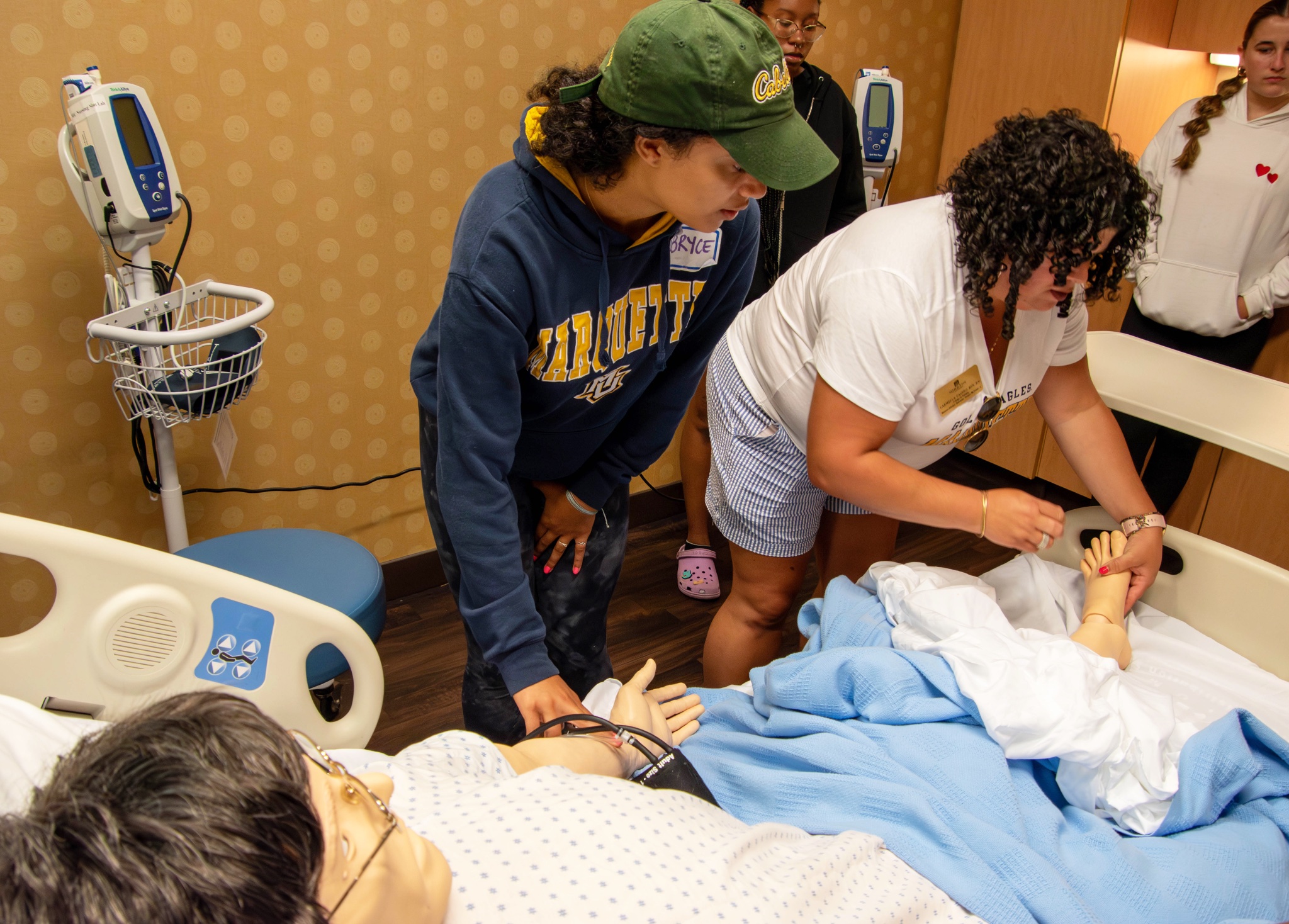Dr. Terrie Garcia fills a lot of different roles in Marquette’s College of Nursing as director of inclusive excellence and student success, as well as lead administrator of Project BEYOND-2, a program designed to improve outcomes for diverse students in nursing.
On one particular day, though, Garcia plays the role of an elderly patient.
She sits alone in a room designed to look like an apartment, waiting for a soon-to-be Project BEYOND-2 student to walk through the door. Once the door opens and a 17-year-old steps through, Garcia talks about problems she’s having with her medications and complains of symptoms from an unknown malady, testing the young nurse’s communication skills while her friends watch the encounter unfold on a TV screen down the hall.
“The students start off awkward and apprehensive about walking into the apartment, but they get better the more they do it,” Garcia says.
In fact, these students are not technically even college students yet; they are high school graduates participating in Project BEYOND-2’s Pre-Admission Intensive program, or PAI. For four days, more than 30 students who qualify for Project BEYOND-2 get acclimated to campus through discussions with professors, group bonding activities, and simulations like the one in which Garcia participated.
“Nursing is all about being part of a team, so you might as well get to know your team before you officially become one.”
Aliann Winchester, Project BEYOND-2 student
The PAI has been around since Project BEYOND-2 was re-launched in 2007. Many program participants are first-generation college students and almost all of them come from backgrounds that are underrepresented in higher education. That can make the transition period from high school to college — already a stressful time — even more challenging.
“I remember going to a lot of sessions that gave me really good information and getting to go to the simulation lab for the first time,” says Crissy Tud, a Project BEYOND-2 alumna who now works as a mentor/adviser in the college. “I met some of my lifelong friends at PAI too.”
Today’s students experience the PAI in much the same way Tud did. Aliann Winchester, an incoming freshman from Waukesha, came to campus early because she thought it would be a good way to get a head start on the social aspects of college.
“During my freshman year of high school, I had a hard time making friends, and I’ve definitely learned since then to branch out and meet new people whenever possible because you need that support group during college,” Winchester says.
“Nursing is all about being part of a team, so you might as well get to know your team before you officially become one.”
That teamwork was on full display during the students’ first trip to the simulation lab. Small groups branched off into different rooms, working together to practice basic nursing skills. Off to the right, two incoming first-year students learned how to check a patient’s pulse. On the left, a program mentor talked to six enrollees about maternity care next to a mannequin of a pregnant woman. Another group in the debriefing room chatted about how to interact with geriatric patients.
Students are also able to get familiar with the resources they’ll need in college, including the College of Nursing website and learning management platform D2L. Professors from their anatomy and physiology classes meet with the group to offer tips about academic success. MUPD tells students how to stay safe around the city.
Seeing future Marquette nurses acclimate so quickly to college life makes Garcia and Tud, first-generation graduates themselves, proud.
“I would have had to navigate the entire college system on my own without Project BEYOND-2,” Tud says. “I’m also an only child and my parents had never gone through the American college application process. It was a lot of finding out who was there to help me, which Project BEYOND-2 definitely was.”
“When I was going to school, there were no programs like the PAI or Project BEYOND-2,” Garcia says. “It would have made a significant impact on my life. I wasn’t always successful in some of the courses I took, but if I had a support system to help me navigate through college and teach me how to learn, I probably would have completed my terminal degree earlier in life.”
Although PAI participants are not expected to have any nursing experience, several of them are already certified nursing assistants. Many, such as Winchester, are mission-driven to be nurses despite being over a month away from their first nursing classes.
“I was a long-term pediatric patient and I absolutely loved my nurses,” Winchester says. “They were the sweetest people in the entire world. I got through my treatment because of them, so I’ve always wanted to be there for people the same way my nurses were there for me.”
The PAI includes activities that go beyond the classroom. Outings such as campus scavenger hunts and game nights help students feel like part of the campus community.
Marquette Nursing is rooted in the Jesuit tradition of cura personalis, or care for the whole person. Staff and faculty believe that students must feel nourished in mind, body and spirit themselves before they can effectively care for others, which is why group fun and nursing simulations are equally important.
“They come in nervous and maybe a little scared on their first day, but by the end of the program, they don’t want to leave because they’ve made friends,” Garcia says.



